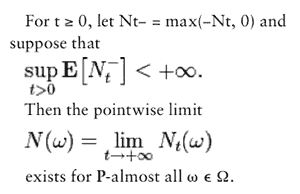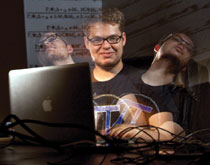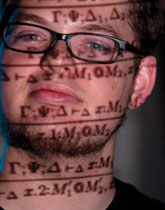The young man awakens and puts on his karate robe. What’s left of his dinner from last night, a plate of Pad Thai made from scratch, sits on a desk not too far away. He had picked at the meal late into the night as he researched programming languages and then, just for fun, pondered Doob’s martingale convergence theorems:

This morning, before plowing back into his work, and maybe the rest of the Pad Thai, he does his usual warm-up exercises, involving Shotokan Karate, which has as its creed: We train our body to be strong, and our mind and spirit to be patient, in order to become the best human beings we can be. The exercises almost always stimulate a cascade of different ideas for how he should approach his work.

The research of Jimmy Koppel, creating automated software re-engineering tools, sounds esoteric. But then he mentions the Y2K scare, when individuals, companies, and organizations worldwide had to check, fix, and upgrade their computer systems at the turn of the century. He wants to prevent those kinds of crippling events that could surface in the future. He believes in his research so strongly that he has decided to work on it full-time rather than be a fourth-year student at Carnegie Mellon University.
His mom, Sue Koppel, isn’t surprised. There was something about her son, even when he was a baby growing up in St. Louis, Mo. She recalls when he was just 18 months old, he provided some startling entertainment for friends, family, and whoever else visited the Koppel household: “When people would come by, Ralph [Koppel’s father] would dump out pieces of a puzzle and say, ‘OK Jimmy, go to it.’ Here, he wasn’t able to talk, and he was just walking some, but not a whole lot. So he would scramble around on the floor putting together some pretty complex and intricate puzzles. It literally was a floorshow. As he put the pieces together, everyone would be amazed and ask, ‘How did he do that?’”
The question went unanswered even as he mastered, by the age of 3, puzzles that had more than 100 pieces. His cerebral prowess extended beyond puzzles. Most 4-year-olds could be amused during car rides by listening to songs from the purple dinosaur Barney. His dad says that when he buckled his son into the car seat for trips around town, the two of them played a game instead. Ralph, a computer programmer with a graduate degree in management information systems and a co-founder of a software company, would give his son algebra problems to solve: “I remember asking him things like, ‘Two x plus seven equals 3, what’s x?’ And he’d solve for x.”
Growing up, while other kids his age were thinking about Little League games and spelling contests, Jimmy was pondering the mysteries of the universe, in part through devouring science fiction and philosophy books. He also thought about structuring his own business. By middle school, he was in business, says his mom: “Many of his classmates were playing video games; Jimmy, though, was also writing them. And my recollection is that they must have been pretty good because he sold them at a fundraiser for his school.”
Exploring new perspectives and seeking new experiences continued to be important to Koppel as he grew into a young man. Take, for example, the time when he was 12 years old on a family trip to Italy. Did he order spaghetti and meatballs? Nope. “We were in Venice,” says his mom, “and he ordered boiled octopus. The waitress said, ‘Young man, you don’t want that,’ and he said, ‘Yes, I do.’ She took him to the window and showed him what the boiled octopus looked like. It didn’t look appetizing to me, this greyish plate, so I said to him, ‘Jimmy, if you get this, you’re going to eat it, and you’re not going to get any of my dinner.’ Then, the owner of the restaurant came out and said, ‘Listen to your mom, you don’t want that,’ but he kept saying, ‘Yes, I do.’ So, I let him order it. He ate most of it, too, and didn’t complain or ask for any of our food.”
Koppel wasn’t a typical youngster, and he wasn’t your typical college student. Three years ago, he enrolled in Carnegie Mellon’s School of Computer Science, which has been consistently ranked among the top computer science programs over the decades. He embraced the challenging curriculum, majoring in both computer science and mathematical sciences. Near the end of his freshman year, he found his passion for software engineering, when one day he “woke up and realized something was wrong” with the architecture of software development. It needed to be simplified, and he felt he was up to the task.
As he contemplated how to start fixing what was wrong with software development, he learned about the “20 Under 20” Thiel Fellowship, which was established by PayPal co-founder and venture capitalist Peter Thiel. Its slogan, “Two Years. $100,000. Some Ideas Just Can’t Wait,” appealed to Koppel. Thiel fellows are given a no-strings-attached grant of $100,000 to focus on their work, their research, and their self-education—all in lieu of college. They are mentored by a network of “visionary thinkers, investors, scientists, and entrepreneurs” who provide guidance and business connections. The hope is that the fellowship will bring “ambitious ideas and projects to life” for people younger than 20.
Koppel certainly had an ambitious project—automating the work in computer programming, which frequently requires making small adjustments in thousands of places. If he could do that, he believes that a future Y2K, with its $300 billion price tag to correct, would be eliminated.

Along with applicants from more than 40 countries, he decided to apply for one of the 20 available 2012 Thiel Fellowships, undeterred by the fine print, which would mean stopping his enrollment in school during the fellowship and moving to California.
For Koppel, that wouldn’t be a problem because of all the credits he had already amassed in his first three years at Carnegie Mellon. “He was really active in taking more classes than most people,” marvels Joe Appel (CS’13), Koppel’s roommate in Morewood Towers. The additional credits, combined with courses over the summer, meant that Koppel could complete his dual degree in computer science and mathematical sciences a year early. And when he learned he was selected for the fellowship, that’s exactly what he decided to do.
After completing his Carnegie Mellon requirements last summer, he moved to San Francisco, and he took with him some valuable insights gleaned during his condensed undergraduate career. In addition to the rigorous academic studies, he credits Carnegie Mellon with simply building his capacity for working hard and working efficiently.
The Thiel Foundation is glad to have him on board and expects great things from him and the other fellows, who are involved in pursuits that include diagnosing disease through biomedical images to eliminating checkout lines and shoplifting in the retail world.
“We continue to be blown away by the quality of ideas coming from 20 Under 20 applicants,” says Jonathan Cain, president of the Thiel Foundation. The co-founder of the fellowship, Jim O’Neill, adds that “since becoming Thiel fellows over the last year, members of our inaugural class have already done some amazing things. They’ve started and sold companies, closed million-dollar funding rounds, won international entrepreneurship and scientific awards, spearheaded innovative social movements, and begun to transform fields like education, software development, clean energy, electric vehicles, robotics, medical technology, and finance.” And it bears repeating that all of them were under the age of 20.
As for Koppel, who is part of the second class, Cain says, “Jimmy has a vision where programmers are more like builders than handymen, and he is working on systems or tools to enable manipulation of programs without having to have access to the source code…it’s inspiring.”
In his Silicon Valley apartment, Koppel can dine on Pad Thai every night for dinner if he chooses. Because the Thiel Fellowship has no micro-manager requesting daily reports, it’s not outside the realm of possibility for a young man with no money worries to lie around all day in his pajamas, play video games, watch TV, and lose an overall sense of urgency.
But Koppel has never been typical, something affirmed by Jonathan Aldrich, who was Koppel’s research mentor and supervisor when he was an undergraduate researcher in the Institute for Software Research at Carnegie Mellon. Aldrich, an associate professor and director of the university’s software engineering minor, observed Koppel constantly as a self-starter who regularly re-evaluated the status of his research to figure out the best direction to proceed. No roadmap was necessary for the student. To have that kind of awareness, says Aldrich, involves astute intuition, as well as intelligence, in order to make progress in uncharted territories. Aldrich believes those characteristics will serve Koppel well during his Thiel Fellowship.
Since moving to San Francisco, Koppel says he has begun to make progress in developing automated software re-engineering tools. He likens his work with an analogy:
“Suppose you wanted to bring the world to a common electrical standard so that you could plug in any device, anywhere. You would need to modify most of the world’s electrical infrastructure, replace every outlet and plug, and tweak the designs of a lot of devices. This would of course be prohibitively expensive. We encounter similar problems in software. However, in the digital world, where you can just say what change should be made and make it happen, this should be easy—but, for most aspects, it’s equally difficult. My vision is to fix that.”
The example everyone knows well is the Y2K scare at the turn of the century. There was concern that the “00” designation for the year 2000 would cause date-related processing to operate incorrectly because the “... 97, 98, 99” ascending numbering assumption would suddenly become invalid with “00.” In addition, some programmers had misunderstood the rule that although years that are exactly divisible by 100 are not leap years, if they are divisible by 400 then they are. Thus, the year 2000 was a leap year. Because these bugs weren’t automatically recognized during coding, everything from banking security mechanisms to global energy infrastructure to major logistics systems were vulnerable. To ensure that these software systems operated after New Year’s Eve 1999, it took fixes.
During those fixes, when software code is being worked on, programs can be unstable, making them vulnerable to additional breakdowns and hacking. Legacy code is software code that was developed in previous eras—using antiquated software programming languages—and is often the most problematic to work with today. Legacy code structures are often long and pieced together over time, which can amplify the problems that bugs create. It takes large amounts of time for programmers to read through the code, create fixes, and insert the fixes into the code to make it more stable and secure.
“Making code Y2K compliant was some of the most tedious, soul-draining work around,” says Koppel. “When [writer and director] Mike Judge wanted to portray a dreary corporate existence in his film Office Space, he chose a protagonist with a job fixing Y2K. Y2K was very much a boring problem, but I am interested in boring problems—boring problems are easy; easy problems can be automated.”
Now on his own, Koppel is teaching himself a new programming language that will potentially, through automated tools, revamp the way that software is developed and maintained, which would eliminate the need for fixes in code. “By making programming simpler, smart people can enter fields like biology and find cures for diseases like cancer,” he says. With that, he has a bite of the leftover Pad Thai and gets back to work.
Emmett Zitelli (HNZ’01) of Pittsburgh is a writer for various publications and is a regular contributor to this magazine.
Related Links:
Koppel Receives "20 Under 20" Thiel Fellowship



